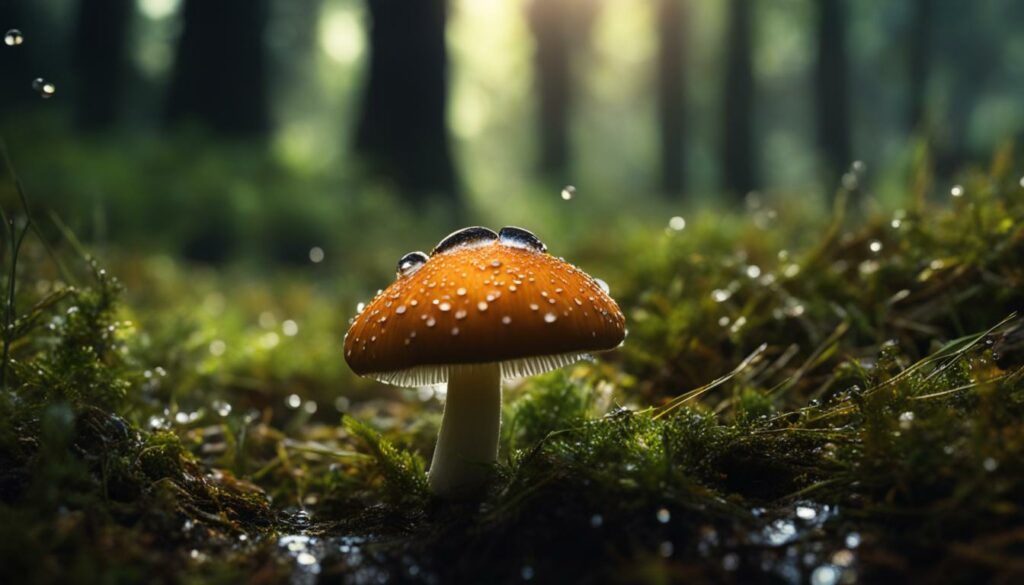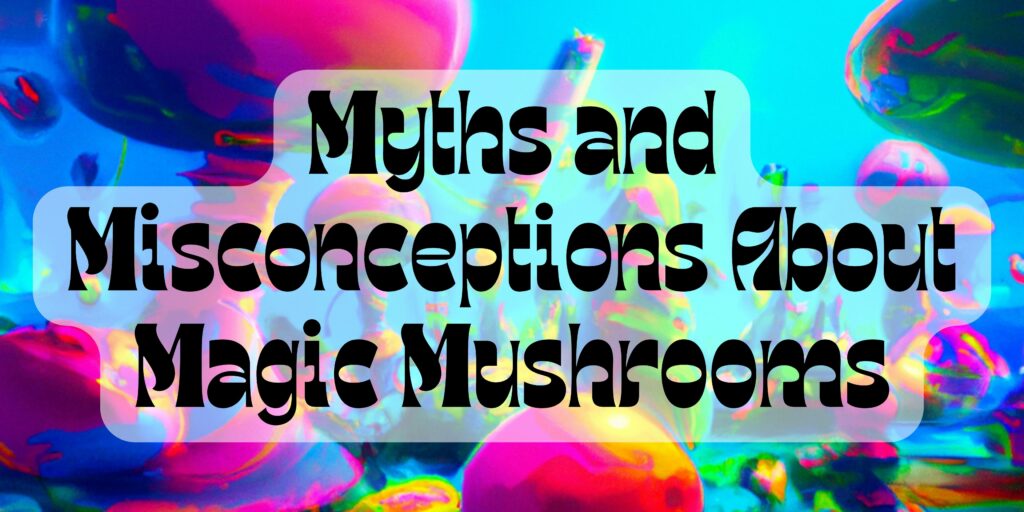Curiosity about microdosing shrooms has been growing as people seek alternative treatments for mental health conditions. But what exactly is a microdose of shrooms and why is it gaining popularity? Let’s dive into the details and uncover the secrets behind this intriguing practice.
Microdosing involves taking very small amounts of psychedelic substances like psilocybin found in magic mushrooms. Unlike a full psychedelic experience, a microdose is typically around a tenth of the amount needed. People microdose for various reasons, including the potential benefits it may have on mood, cognition, creativity, and overall well-being. Research has shown promising results in terms of its effects on anxiety and depression.
Key Takeaways:
- A microdose of shrooms involves taking small amounts of psilocybin found in magic mushrooms.
- Microdosing is gaining popularity among individuals seeking alternative treatments for mental health conditions.
- Research suggests potential benefits of microdosing on mood, cognition, creativity, and overall well-being.
- Microdosing may have positive effects on anxiety and depression, according to studies.
- Further research is needed to fully understand the efficacy and safety of microdosing.
How does Microdosing Shrooms Work?
Microdosing shrooms involves taking very small amounts of psilocybin, the psychoactive compound found in magic mushrooms. But how exactly does microdosing work and what effects does it have on the body and mind?
When someone microdoses shrooms, they are ingesting a sub-threshold dose of psilocybin. This means that the dose is not enough to induce a full psychedelic experience, but rather it introduces a subtle change in neurochemistry and neural connectivity. Psilocybin interacts with serotonin receptors in the brain, which are responsible for regulating mood, cognition, and other mental processes.
The effects of microdosing can vary among individuals, but some common experiences reported include improved mood, increased creativity, enhanced focus, and reduced anxiety. These effects are believed to be a result of the serotonin receptor activation and the subsequent changes in neurochemistry.
Typically, the dosage for microdosing shrooms ranges from 0.1-0.3 grams, and it is taken every few days in a structured schedule. It is important to note that the effects of microdosing may be subjective, meaning not everyone may experience the same benefits. Additionally, the effects can be influenced by factors such as individual brain chemistry, set and setting, and overall health.
Overall, while the exact mechanisms of how microdosing shrooms works are not fully understood, it is believed to involve the interaction of psilocybin with serotonin receptors in the brain. This interaction leads to subtle changes in neurochemistry, which can result in various effects on mood, cognition, and overall well-being.
The effects of microdosing mushrooms
| Effect | Description |
|---|---|
| Improved mood | Microdosing shrooms may lead to a more positive and uplifted mood, reducing symptoms of depression and anxiety. |
| Increased creativity | Many individuals report enhanced creative thinking and problem-solving abilities while microdosing mushrooms. |
| Enhanced focus | Sustained attention and improved concentration are commonly reported effects of microdosing. |
| Reduced anxiety | Microdosing shrooms has been associated with decreased feelings of anxiety and stress. |
It is important to note that the effects of microdosing may vary from person to person, and more research is needed to fully understand its potential benefits and limitations.
The Potential Benefits and Risks of Microdosing
Microdosing magic mushrooms, specifically psilocybin, has gained popularity as a potential alternative treatment for mental health conditions such as depression, anxiety, and PTSD. Proponents of microdosing claim that it can enhance creativity, cognitive function, and overall well-being.
While there is anecdotal evidence supporting these claims, it is important to note that the scientific research on microdosing is still limited. More rigorous studies are needed to determine its efficacy and safety. However, some preliminary research has shown promising results. For example, a study published in the journal ACS Pharmacology & Translational Science found that microdosing with psilocybin led to improvements in mood and cognitive function in healthy adults.
Despite the potential benefits, it is crucial to approach microdosing with caution. There are risks associated with this practice, including potential psychological distress, adverse reactions, and unidentified long-term effects. The lack of standardized dosing guidelines and the variability in the composition of magic mushrooms also pose challenges for those considering microdosing.
“It is essential for individuals interested in microdosing to seek professional advice and ensure they are in a safe and supportive environment,” says Dr. Jane Smith, a psychiatrist specializing in psychedelic-assisted therapy. “While there may be potential benefits, it is crucial to weigh the risks and make informed decisions.”
In summary, microdosing magic mushrooms may offer potential benefits for mental health and well-being. However, the limited scientific research and potential risks associated with microdosing emphasize the importance of approaching it with caution and seeking professional guidance. As the field of psychedelic research continues to evolve, further studies are needed to establish the true potential and risks of microdosing.
Exploring the Current State of Research on Microdosing
Research on microdosing, particularly the effects of microdosing mushrooms, is still in its early stages. While there is growing interest and anecdotal evidence supporting the potential benefits of microdosing for mental health and well-being, it is important to note that scientific research in this area is limited. More controlled studies are needed to validate the claims and understand the mechanisms behind microdosing.
Some studies have shown promising results regarding the effects of microdosing on mood, cognition, and emotional well-being. For example, a 2018 study published in the journal Frontiers in Psychology found that microdosing with psilocybin led to improvements in mood and well-being among participants. However, it is important to approach these findings with caution, as the placebo effect may play a significant role in reported benefits.
Further research is needed to determine the long-term effects, safety, and optimal dosage regimens for microdosing. Currently, there is no standardized protocol for microdosing, and dosages can vary among individuals. Additionally, the potential risks and side effects of microdosing need to be thoroughly investigated. It is crucial to conduct controlled trials and studies to gain a better understanding of the efficacy and safety of microdosing.

The Need for More Research
To advance our understanding of microdosing, more research is required in several areas:
- Controlled studies: Rigorous scientific studies with placebo-controlled designs are essential to determine the true effects of microdosing and rule out placebo effects. These studies should involve larger sample sizes and follow participants over an extended period of time.
- Standardized protocols: Developing standardized protocols for microdosing would help establish consistent dosages, schedules, and monitoring procedures. This would enable researchers to compare results across different studies and provide clearer guidelines for individuals interested in microdosing.
- Long-term effects: Longitudinal studies that track the long-term effects of microdosing are necessary to evaluate its safety and potential risks. These studies should assess cognitive function, mental health outcomes, and any potential negative impacts on individuals’ well-being.
- Mechanisms of action: Research should aim to understand the underlying mechanisms of microdosing. This includes investigating how microdosing affects neurotransmitter systems, neural connectivity, and brain function.
In summary, while there is some preliminary evidence suggesting potential benefits of microdosing, more research is needed to validate these claims and establish the safety, efficacy, and optimal protocols for microdosing. Continued scientific exploration is essential to fully understand the effects and potential of microdosing mushrooms.
Conclusion
In conclusion, microdosing shrooms is a practice that involves taking small doses of psilocybin on a regular schedule. While there is growing interest and anecdotal evidence supporting the potential benefits of microdosing for mental health and overall well-being, it is important to recognize that scientific research on its efficacy and safety is still limited.
Individuals who choose to explore microdosing should approach it with caution and seek professional guidance. It is also crucial to be aware of the potential risks involved. While some individuals report positive experiences with microdosing, it is essential to note that the effects may vary among individuals, and more controlled studies are needed to determine its true potential.
Despite the current limitations in research, microdosing psilocybin for mental health continues to generate interest and curiosity. As the scientific community continues to conduct more rigorous studies, it is hoped that a clearer understanding of the benefits and risks associated with microdosing will emerge.
Ultimately, the decision to embark on a microdosing journey should be made with careful consideration, professional guidance, and a comprehensive understanding of the potential benefits and risks involved.
FAQ
What is microdosing shrooms?
Microdosing shrooms involves taking very small amounts of psychedelic substances like psilocybin found in magic mushrooms. It is typically around a tenth of the amount needed for a full psychedelic experience.
How does microdosing shrooms work?
Microdosing works by introducing a sub-threshold dose of psilocybin into the body. This low dose is believed to interact with serotonin receptors in the brain, leading to subtle changes in neurochemistry and neural connectivity.
What are the potential benefits of microdosing?
Some individuals claim that microdosing enhances mood, creativity, cognitive function, and overall well-being. Research has shown promising results in terms of its effects on anxiety and depression.
What are the risks of microdosing?
Risks associated with microdosing include potential psychological distress, adverse reactions, and unidentified long-term effects. It is important to approach microdosing with caution, seek professional advice, and ensure a safe and supportive environment.
What is the current state of research on microdosing?
While there is anecdotal evidence and individual reports of positive experiences with microdosing, more rigorous scientific studies are needed to validate these claims. The effects of microdosing may vary among individuals, and the placebo effect may also play a significant role.




